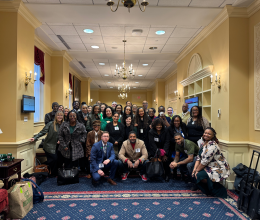CALVERT COUNTY, MD – The Maryland Board of Public Works and the Calvert County Sheriff’s Office today approved final settlement of a Maryland Public Information Act lawsuit brought by the American Civil Liberties Union (ACLU) of Maryland challenging unlawful use of steep monetary fees to block disclosure of critical public records. Under the settlement – which follows Circuit and Appellate Court rulings rejecting the Calvert Sheriff’s core legal arguments – the Sheriff will produce all records requested by the ACLU concerning invasive police searches from 2020 through 2024 without charge. Further, the Sheriff will pay $35,000 in legal fees incurred by the ACLU in securing release of the records.
The settlement resolves a 2022 Maryland Public Information Act (MPIA) lawsuit demanding free access to records detailing invasive and abusive searches conducted by Calvert Sheriff’s deputies, which Calvert residents allege primarily targeted Black community members. The suit – litigated by the ACLU and lawyers from Zuckerman Spaeder working pro bono – sought to vindicate the ACLU’s right to meaningful consideration of its request for waiver of any fees associated with search and production of those public records. The ACLU’s lawsuit came on the heels of a sweeping package of police accountability reforms passed by Maryland’s General Assembly in 2021, including an amendment to the MPIA known as “Anton’s Law”, which the ACLU argued reflected the public’s desire to learn more about invasive police tactics. In rejecting the Calvert Sheriff’s argument that disclosure of these types of public records would not serve the public interest, two courts signaled their agreement with the ACLU’s position.
ACLU of Maryland Legal Director Deborah Jeon praised the developments as a boon for the public good in Calvert County and beyond, both by finally providing details about the Sheriff’s search practices, and by creating disincentives for improper charging of search and production fees, thus helping to ensure future access across Maryland to information about potentially illegal police practices. “By setting clear rules for records disclosures in the public interest and imposing financial consequences for government actors who seek to obstruct transparency and accountability, the underlying court rulings and this settlement ensure that the vision behind Anton’s Law and all of Maryland’s policing reforms can become a reality,” said Jeon.
The case originated in 2021, after Black residents in Calvert County alerted the ACLU to disturbing practices, including invasive strip searches, being conducted in public places by Calvert Sheriff’s deputies. To investigate these allegations, the ACLU requested documents reflecting any invasive searches, pursuant to the Maryland Public Information Act. The Sheriff delayed responding to the request, and ultimately refused to search for or produce the records unless the ACLU would pay more than $12,000 upfront. After efforts to amicably resolve the matter failed, the ACLU sued the Sheriff and his office under the MPIA, contending the Sheriff failed to consider the clear public interest in releasing records that would likely evidence such harmful police practices.
The use of such burdensome fees to withhold public information that might reveal police misconduct pointed to a troubling new statewide pattern in response to Anton’s Law – the 2021 law amending the Maryland Public Information Act to make records of policing complaints and discipline more accessible. This law seeks to guard against police abuse, following the concealment of past misconduct by the officer who killed Eastern Shore teenager Anton Black in 2018. Once the law took effect, however, police departments around the state started employing other means to avoid disclosure of damaging information, and some settled on the use of high monetary fees to make the requests financially untenable for community and public interest organizations like the ACLU.
The Sheriff fought the ACLU lawsuit in Baltimore City Circuit Court, contending that he was entitled to charge for the records because no public purpose would be served by their release. Baltimore Circuit Court Judge Martin Schreiber disagreed, citing the enormous public interest and concern about policing issues both nationally and across Maryland, and ordering the Sheriff to produce the records without charge. The Sheriff’s office appealed Judge Schreiber’s ruling to the Appellate Court of Maryland.
Zuckerman Spaeder attorney Samantha Miller Kavanagh argued the appeal before a three-judge panel in May 2024. Of today’s outcome, Kavanagh said: “The ACLU and other organizations play a vital role in ensuring access to information that allows citizens to hold government agencies, including law enforcement, accountable. This case makes clear that government officials need to fairly consider the public interest when deciding whether to charge excessive fees for the costs of compliance with public records requests.”
In August, the County’s appeal was largely rejected in a forceful and unanimous opinion authored by Appellate Judge Douglas Nazarian. The Court held that the Sheriff had acted “arbitrarily and capriciously” by denying the ACLU’s request for a waiver of fees, condemning the County’s position that the request would not promote the public interest as “sheer nonsense.” The Court provided extensive guidance about how governments should analyze requests for public interest fee waivers under the MPIA and sent the case back to the Sheriff for reassessment. (An intervening decision from the Supreme Court of Maryland prevented the Appellate Court from simply ordering the Sheriff to grant the fee waiver, as Judge Schreiber had done below.)
On remand, the parties negotiated the settlement approved today by the Board of Public Works, with the Sheriff agreeing to grant a waiver of the full $12,271.50 fee originally charged for the records, and instead to pay the ACLU $35,000 for its work on the successful litigation.
The ACLU’s legal team included Samantha Miller Kavanagh and William J. Murphy of Zuckerman Spaeder, as well as Deborah Jeon, Dara Johnson and Gina Elleby from the ACLU of Maryland.







